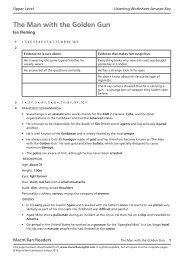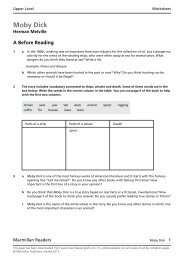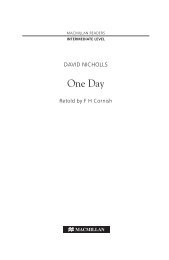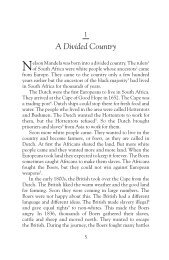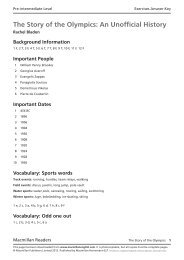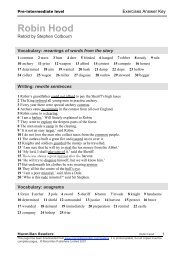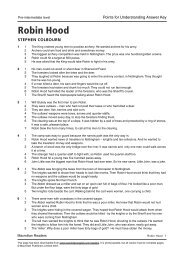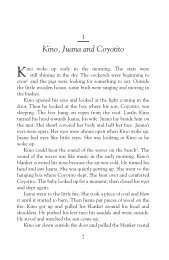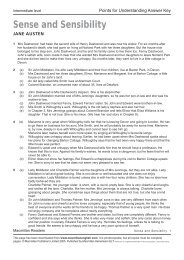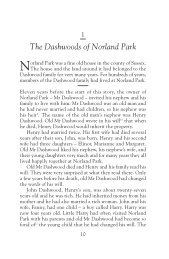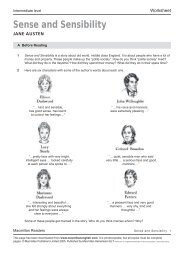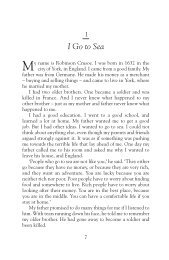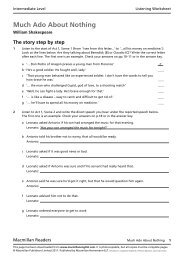Moby Dick Further Study Questions - Macmillan Readers
Moby Dick Further Study Questions - Macmillan Readers
Moby Dick Further Study Questions - Macmillan Readers
Create successful ePaper yourself
Turn your PDF publications into a flip-book with our unique Google optimized e-Paper software.
<strong>Further</strong> <strong>Study</strong> <strong>Questions</strong> Answer key Upper<br />
Ahab<br />
2 Describing Ahab<br />
Mad: Ahab is not clinically insane. He is fully aware of the consequences of his decisions, but he is<br />
driven. Sometimes he seems to want to stop the hunt but can’t. However, he is lucid and intelligent,<br />
although his decisions may be described as ‘crazy’.<br />
Superstitious: Ahab shows his superstition on more than one occasion, especially surrounding<br />
his harpoon: he asks his harpooners to cool the harpoon with their blood; he baptises it with fire<br />
during the typhoon; he insists on choosing his own team for his whaling boat and listens carefully to<br />
Fedallah’s prophecies.<br />
Charismatic: Ahab is very charismatic. He succeeds in filling his crew with enthusiasm for the hunt.<br />
Even though they think he is crazy, they are willing to follow him. At one point he realises that he<br />
could damage his relationships with the crew if he pushes them too far. They want to stop to repair<br />
the oil barrels; he wants to continue the hunt. He senses the danger of insisting on having his own<br />
way, and, for once, puts the crew’s feelings before his own.<br />
Obsessed: He only thinks about the whale. Every conversation he has with every passing ship is about<br />
<strong>Moby</strong> <strong>Dick</strong>. During these conversations he is only interested in finding out where the whale is and<br />
where he’s heading. He does not stop to help the Rachel even though he knows the captain personally.<br />
He dreams about the whale, but he also dreams about his own death. Hunting the whale is more<br />
important to him than anything else in his life, more important than his own life.<br />
Other possible adjectives to describe Ahab: stubborn, selfish, tortured, revengeful, destructive,<br />
single-minded, strong-willed.<br />
3 Ahab’s character within the book<br />
Is Ahab a good captain? Does he look after his boat and crew? Does he think about the needs of<br />
other boats at sea?<br />
He is an efficient and effective captain. His crew obey and respect him. The whaling boat functions<br />
efficiently and the crew seem content. In this way he is a good captain. But he is willing to put his<br />
men and his boat in danger in order to get his revenge on the whale. Even when Fedallah is killed in<br />
the hunt, he does not stop. On more than one occasion he is asked to help other ships, but he refuses,<br />
because he can only think about <strong>Moby</strong> <strong>Dick</strong>. In this way, he is not a good captain.<br />
Is he a good leader of men? How does he persuade the whalers to help him hunt down <strong>Moby</strong> <strong>Dick</strong>?<br />
Think about how he uses the sailors’ fears and superstitions.<br />
Ahab knows how to motivate his crew. Early in the voyage he calls all the crew on deck and he explains<br />
the purpose of the voyage. He first uses competition to motivate and get them interested in <strong>Moby</strong><br />
<strong>Dick</strong>. He hammers a gold coin to the mast. The first sailor to see the white whale will win the coin. He<br />
then explains the reason for the hunt and calls on his crew to support him:<br />
‘To chase that white whale all over the earth until he spouts black blood and dies. Will you do<br />
that?’<br />
‘Yes, yes,’ shouted the harpooners. ‘Death to <strong>Moby</strong> <strong>Dick</strong>! Death to <strong>Moby</strong> <strong>Dick</strong>!’<br />
<strong>Macmillan</strong> <strong>Readers</strong> <strong>Moby</strong> <strong>Dick</strong> 6<br />
This page has been downloaded from www.macmillanenglish.com. It is photocopiable, but all copies must be complete pages.<br />
© <strong>Macmillan</strong> Publishers Limited 2009. Published by <strong>Macmillan</strong> Heinemann ELT. Heinemann is a registered trademark of Pearson Education, used under licence.



